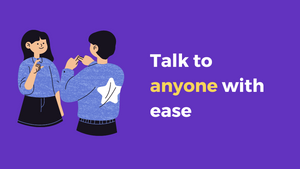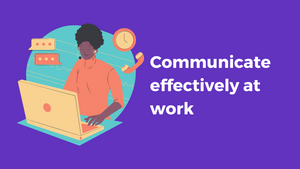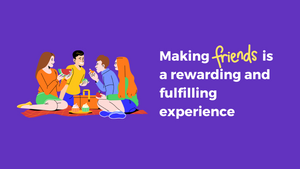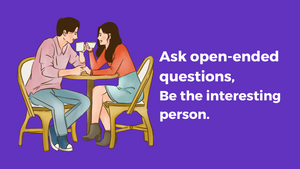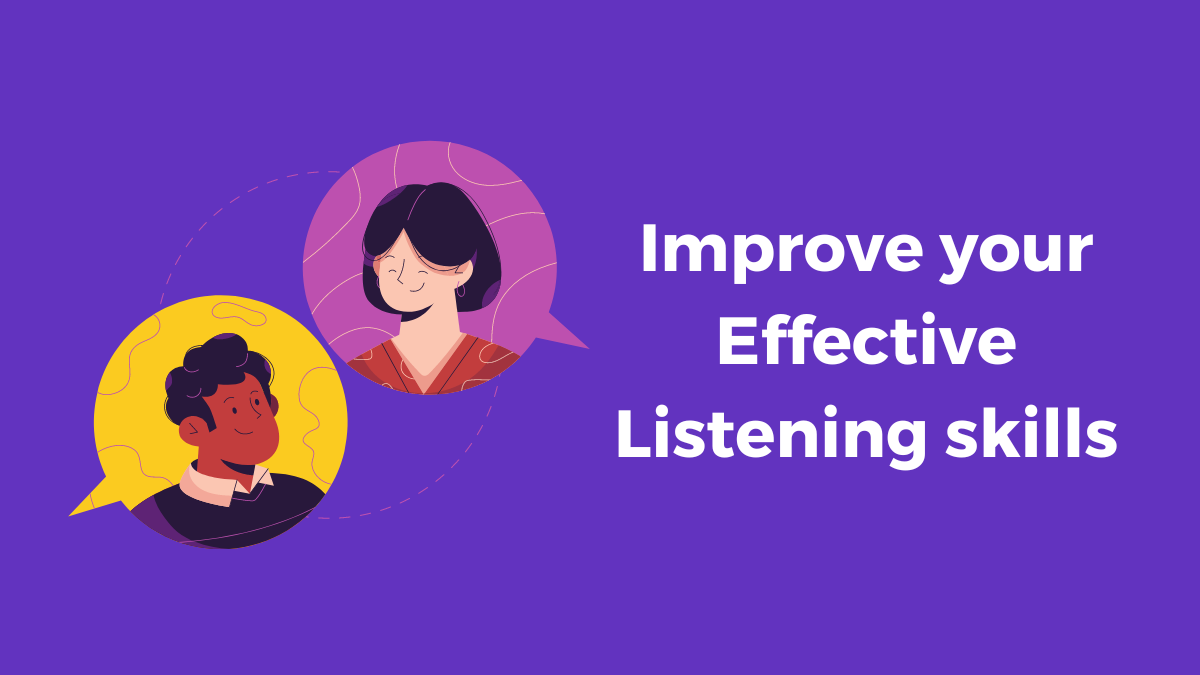
How to improve your listening skills
Whether it's in a business meeting or chitchatting with a friend, Your listening skills will always impact the quality of communication or relationships.
However, It seems difficult, in today’s fast-paced world full of distractions and information overload. And many of us struggle with common listening barriers, such as biases, distractions, and preconceived beliefs.
Also Read - How to defend yourself in an argument?
That’s why, In this blog post, we will explore practical tips and techniques to improve your listening skills.
Table of Contents
- Understanding the Basics of Listening
- Identifying Barriers to Effective Listening
- Ways to Overcome Barriers to Effective Listening
- Practicing Active Listening
- Develop Empathetic Listening Skills
- Cultivating Mindful Listening
- Enhancing Nonverbal Communication Skills
- Overcome Common Listening Pitfalls
- Conclusion
Understanding the Basics of Listening
Listening is not just hearing words, it’s more than that. It’s about receiving, interpreting, and understanding the message.
Definition of Effective Listening
The process of receiving, interpreting, and understanding the speaker's messages through verbal or non-verbal communication is Effective Listening. It includes understanding the tone, emotions, context, and other cues to complete the meaning of the message.
Types of Effective Listening
- Active Listening: In active listening, you give your full attention to the speaker, while maintaining eye contact. You must try to understand the speaker’s message and ask questions if needed.
- Passive Listening: This is what most of us do when we are not interested in the topic. It includes hearing or pretending to hear the speaker. However, it can lead to misunderstandings.
- Empathetic Listening: It requires you to be supportive and non-judgmental. You have to not only understand the message but also empathize with the speaker's emotions and feelings.
- Critical Listening: Critical listening involves not just understanding the message but also analyzing and evaluating it. You also have to check its reliability by asking questions to the speaker. You must have used critical listening in your life. One of them is in your classroom.
Importance of Effective Listening in Communication
Listening can help you to build trust, strengthen relationships, and establish understanding.
With effective listening, you can prevent misinterpretations and misunderstandings.
Effective listening also allows you to better understand complex information, and diverse perspectives, and give feedback.
Identifying Barriers to Effective Listening
To overcome the barriers to effective listening, first, we have to identify them. There can be both internal and external barriers.
Internal Barriers
- Distractions: It is the biggest barrier to effective listening (At least for me). Multitasking, personal concerns, or wandering thoughts, can impact your ability to concentrate on the message and listen.
- Biase: You may have already seen this or experienced it yourself. Biases allow you to misinterpret the message and judge the speaker. It can quickly escalate to a debate or worse.
External Barriers
- Environment: The environment you are in, can make it hard to focus on effective listening. Most of the time it is crowded or uncomfortable places that make you lose focus from actively listening.
- Noise: It doesn’t matter, if it’s from the environment or from the device you are listening from, noise can make it hard to listen and make it easy to lose focus.
- Technology: In this day of age we all use technology in our day-to-day life. Technology makes many tasks easy for us, however using them while listening can easily make us lose focus, and hold our listening skills back.
Ways to Overcome Barriers to Effective Listening
- Practice Mindfulness: Try to be aware of your thoughts, biases, and emotions. If you started to process any of these then consciously bring yourself back to the present moment and focus on the conversation.
- Suspend Judgment: Try to be open-minded. And make sure you don’t judge or make assumptions until you have fully understood the message.
- Seek Clarification: Sometimes it can be a little difficult to understand the speaker’s message, in that case, ask questions for clarification and clear any misunderstandings.
- Show Empathy: Try to show empathy. It can be hard for many, however, to try to understand the speaker’s perspective and emotions behind the message.
- Develop Nonverbal Communication Skills: Try to pay attention to the speaker’s nonverbal actions, such as body language and facial expressions. It may give you a better understanding of their message.
- Minimize Distractions: Try not to multitask while listening in a conversation if possible. Checking your smartphone while conversing can impact your conversation. Reduce any distractions if possible.
Practicing Active Listening
Active listening has a key role in effective communication. You have to actively engage in the conversation by receiving and interpreting the speaker’s message.
Definition and Principles of Active Listening
Understanding the speaker’s message by focusing on their words, tone, body language, and emotions while not interrupting and judgments before understanding the message is active listening.
Active listening has some principles including being attentive, empathic, respectful and seeking to understand the speaker’s perspective and message.
Techniques for Active Listening
- Maintain Eye Contact: Try to maintain positive eye contact. Remember to balance your eye contact, not too little not too much. Eye contact indicates that you are engaged and interested in the conversation, and helps you to build trust and a positive relationship with the speaker.
- Nodding: Nodding your head shows you are following and understanding the speaker’s message and encourages them to continue speaking.
- Paraphrasing: Try to restate the speaker’s message in your own words, it shows that you are listening. It also helps you to clarify any misunderstandings you have.
- Ask Open-Ended Questions: Asking open-ended questions can make a conversation keep going thus giving you more information to listen to. It helps you to know the other person more. These questions are important if you are on a date. Some examples of open-ended questions are “What is the best part of today till now? ”, and “What do you think of this food?”. Here is an article I wrote on this topic - How to ask open-ended questions?
Benefits of Active Listening in Building Relationships and Understanding
Active listening increases mutual understanding and respect between you and the speaker. It helps you to build trust and can create a relationship with the speaker.
Active listening creates a positive environment for communication. Depending on the switching it can encourage the speaker to express themselves more.
It can give you new information, ideas, and perspective about the speaker or other person of things.
Develop Empathetic Listening Skills
Empathetic listening is a critical part of effective listening. It involves understanding the speaker’s perspective and emotions and not judging him/her.
Definition and Importance of Empathetic Listening
Empathetic listening is understanding the speaker’s perspective and emotions. It involves acknowledging their emotions by understanding the message from their perspective.
It helps to build trust and relationships, promotes better understanding with mutual respect, and helps to clear misunderstandings.
Techniques for Empathetic Listening
- Showing Empathy: Try to show empathy while listening to them. Show that you understand not only the message but also the emotion behind it.
- Avoiding Judgment: Try not to judge the speaker. Avoid any assumptions and allow them to express themselves freely.
- Asking Clarifying Questions: It is always a good idea to clarify any or all misunderstandings. It also shows them that you are actively listening to them and interested in the conversion.
How Empathy Enhances Communication and Creates Relationships
Empathetic listening promotes understanding and mutual respect between you and the speaker, which also enhances communication and creates a healthy relationship.
Because the speaker feels heard and understood, it helps to build trust and relationships. It also encourages them to express themselves more freely.
Cultivating Mindful Listening
Listening, which involves being present and engaged in the conversation, having no preconceived notions or distraction is Mindful listening.
Mindful listening helps you to reduce stress and anxiety, improve your focus and comprehension, and enhance connection and understanding.
Techniques for Practicing Mindful Listening
- Being Present: Focus on the speaker and the conversation, and try not to get distracted.
- Avoiding Multitasking: If possible try to avoid other distracting activities, such as checking your phone.
- Active Engagement: Try to engage in the conversation whenever possible. Try to ask questions, provide feedback or show empathy if needed.
- Non-Judgmental Attitude: Allow the speaker to express themselves freely. Try not to make any assumptions or judgments, at least not until you have fully understood the message.
- Self-Awareness: You should always be aware of your own biases and notions. And try to overcome them.
How Mindfulness Improves Comprehension and Connection
It helps to enhance comprehension by improving your focus and attention. It also helps to reduce distractions and misunderstandings.
It improves connection and understanding by creating empathy, respect, and mutual trust. Which leads to more open and honest conversations.
One important step towards overcoming your biases and notions is to be aware of your thoughts and feelings. And which Mindfulness helps you to do it.
Enhancing Nonverbal Communication Skills
Importance of Nonverbal Communication in Effective Listening
Nonverbal communication provides additional information besides the words spoken.
It can convey the speaker’s emotions, and intentions, which helps to emphasize and clarify the message.
It can also counter or support verbal messages, and provide a more precise interpretation of the message.
Ways to Improve Nonverbal Communication Skills for Effective Listening
- Body Language: Pay attention to the speaker’s posture, hand movements, and gestures, and try to understand them with the message.
- Facial Expressions: Facial expressions are an important part of the face to face communication. They convey emotions. So try to understand them.
- Eye Contact: Keep easy and appropriate eye contact with the speaker. It shows attentiveness.
- The tone of Voice: Try to notice the tone of voice. It can also convey the speaker’s emotions and attitude.
Overcome Common Listening Pitfalls
Common Listening Pitfalls to Avoid
Interrupting: Interrupting the speaker can be considered rude behavior. It not only interrupts the conversation but can indicate disrespect for the speaker.
Assuming: Assuming things about the speaker or its message without even verifying the information. It can lead to misunderstandings and conflicts.
Jumping to Conclusions: Without fully understanding the speaker’s message and jumping to conclusions can lead to inaccurate or misinformation.
Strategies for Overcoming These Pitfalls and Becoming a Better Listener
- Practice Active Listening: Active listening is important to overcome these pitfalls. It can help you to understand the speaker’s message without any confusion.
- Seek to Understand: Try to understand the speaker’s perspective and ask questions if needed.
- Avoid Making Assumptions: Try not to make any assumptions about the speaker or speaker’s message.
- Take Notes: If it is possible try to take notes. It will help you to stay engaged in the conversation and remember important details.
Conclusion
Effective listening is an important skill for successful communication and building strong relationships.
To recap, some key points to remember:
- Pay attention and stay present at the moment
- Try to avoid distractions
- Be open-minded
- Practice active listening
- Cultivate empathy and practice mindful listening
- Improve your nonverbal communication skills
It’s important to not only practice but to apply these skills in your everyday life. These skills can help you to build trust, and create understanding, and connections.
In conclusion, effective listening is not only a valuable skill but also a key part of your daily communication.

